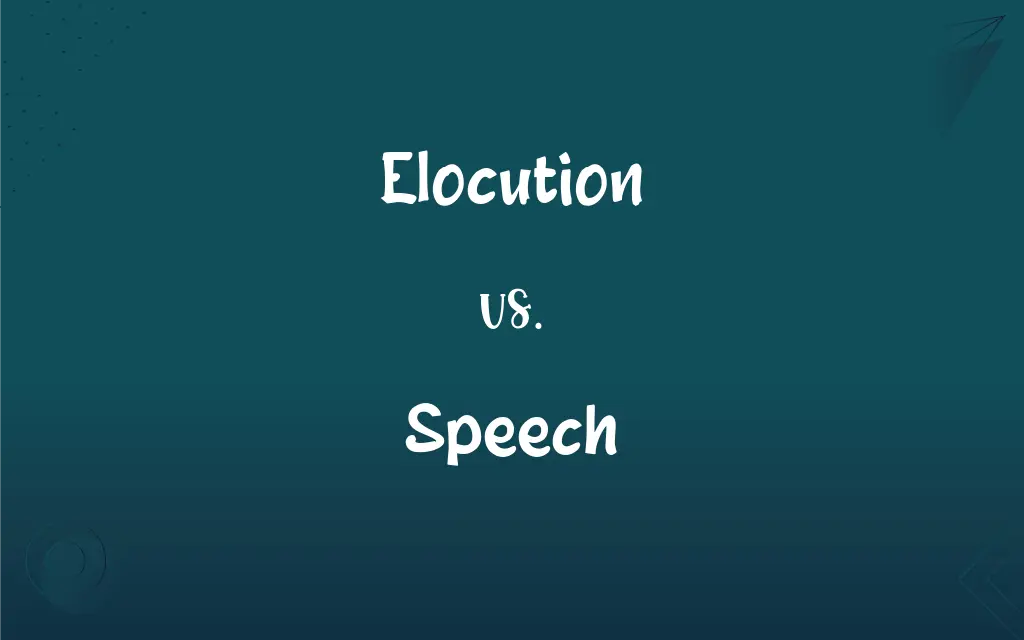Elocution vs. Speech: What's the Difference?
Edited by Aimie Carlson || By Harlon Moss || Updated on October 17, 2023
Elocution is the art of clear and expressive speaking, while speech is the act of expressing thoughts verbally.

Key Differences
Elocution refers to the skill and art of clear and expressive speaking, particularly in public settings. It emphasizes pronunciation, tone, pitch, and the general style of delivery. On the other hand, speech is a broader term, denoting the general act or process of expressing thoughts, feelings, or information verbally, irrespective of the style of delivery.
Elocution is often linked to the study and practice of effective communication. It deals with nuances such as voice modulation, diction, and rhythm, ensuring the speaker's words have the desired impact on the audience. Speech, meanwhile, is a natural human ability and encompasses any verbal expression, from everyday conversation to a formal address.
In the realm of public speaking, elocution is pivotal in ensuring the message is delivered not just clearly but also persuasively. Effective elocution can engage, captivate, and influence an audience. Speech, in this context, would be the content or the actual words and ideas being conveyed.
While both elocution and speech are interconnected and essential in effective communication, they have distinct focuses. Elocution concentrates on the "how" of speaking, molding the delivery for maximum impact. Speech is concerned with the "what," the actual content or message being shared.
Comparison Chart
Definition
Art of clear and expressive speaking.
Act of expressing thoughts verbally.
ADVERTISEMENT
Emphasis
Delivery style and technique.
Content and message.
Study
Focuses on voice, pitch, and rhythm.
Encompasses language and semantics.
Usage
Often associated with public speaking.
Encompasses all verbal communication.
Objective
To captivate and influence an audience.
To convey information or emotions.
Elocution and Speech Definitions
Elocution
The art of effective public speaking.
She took elocution lessons to improve her stage presence.
ADVERTISEMENT
Speech
The ability to produce sounds or words.
After his accident, he had difficulty with speech.
Elocution
The practice of expressive vocal delivery.
Elocution plays a crucial role in dramatic performances.
Speech
The communication or expression of thoughts using spoken words.
They engaged in a long speech about their shared interests.
Elocution
The skill of clear pronunciation and articulation.
His elocution was impeccable, making every word audible.
Speech
The act of expressing or describing thoughts, feelings, or information verbally.
The president's speech captivated the nation.
Elocution
Mastery in the modulation of voice and gesture.
Her elocution was so compelling that she held the audience's attention effortlessly.
Speech
A formal address delivered to an audience.
She received a standing ovation after her motivational speech.
Elocution
The study of speech sounds and their production.
Elocution classes often begin with exercises on breath control.
Speech
A piece of spoken language.
His speech was filled with intricate metaphors.
Elocution
The art of public speaking in which gesture, vocal production, and delivery are emphasized.
Speech
The faculty or act of speaking.
Elocution
A style or manner of speaking, especially in public.
Speech
The faculty or act of expressing or describing thoughts, feelings, or perceptions by the articulation of words.
FAQs
What is elocution?
Elocution is the art of clear and expressive speaking, especially in a public setting.
Can everyday conversation be considered a form of speech?
Yes, everyday conversation is a form of speech as it involves expressing thoughts verbally.
How does elocution aid in effective communication?
Elocution enhances voice modulation, pronunciation, and rhythm, making communication more impactful.
Is elocution only about voice?
No, elocution covers voice, but also gesture, posture, and facial expressions in the context of speaking.
Is elocution the same as diction?
They're related but not the same. Elocution covers many aspects of speaking, including diction, which is word choice and pronunciation.
Is elocution relevant in today's digital age?
Absolutely. Elocution is crucial for podcasts, video content, virtual presentations, and more.
How do elocution techniques vary across cultures?
Different cultures have unique rhythms, pitches, and tonalities, influencing elocution techniques.
How is speech different from writing?
Speech is verbal and often spontaneous, while writing is structured and visual.
How does speech differ from elocution?
While speech is the act of expressing thoughts verbally, elocution focuses on the style and technique of that expression.
What are the components of a good speech?
Good speech comprises clear content, structure, coherence, and relevance to the audience.
Can elocution improve confidence?
Yes, mastering elocution can boost confidence, especially in public speaking or performance settings.
What's the importance of feedback in refining speech?
Feedback helps identify areas of improvement in content, clarity, and delivery of speech.
Is elocution important for public speaking?
Yes, elocution ensures clarity, expressiveness, and impact in public speaking.
Do elocution classes help with accents?
Yes, elocution classes often address accent reduction and clear pronunciation.
Is a speech always planned and structured?
Not always. While some speeches are planned, others can be spontaneous verbal expressions.
Is speech limited to verbal communication?
Primarily, yes. Speech pertains to verbal expression, but non-verbal cues can complement it.
Does every language have its form of speech?
Yes, speech is a universal human capability, and every language has its verbal expressions.
Can speech disorders be corrected?
Many speech disorders can be treated or managed with therapy and intervention.
Why is elocution often taught to actors?
Elocution helps actors speak clearly and expressively, essential for effective performances.
Can someone have good speech but poor elocution?
Yes, someone might convey ideas well (good speech) but may lack clear pronunciation or effective delivery (poor elocution).
About Author
Written by
Harlon MossHarlon is a seasoned quality moderator and accomplished content writer for Difference Wiki. An alumnus of the prestigious University of California, he earned his degree in Computer Science. Leveraging his academic background, Harlon brings a meticulous and informed perspective to his work, ensuring content accuracy and excellence.
Edited by
Aimie CarlsonAimie Carlson, holding a master's degree in English literature, is a fervent English language enthusiast. She lends her writing talents to Difference Wiki, a prominent website that specializes in comparisons, offering readers insightful analyses that both captivate and inform.































































